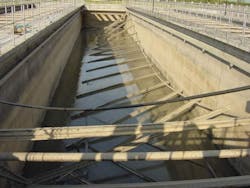Q&A: How to Prevent Catastrophic Chain & Scraper Failure
Evoqua Water Technologies
210 Sixth Avenue, Suite 3300
Pittsburgh, PA 15222
United States
Phone: 978.614.7111
Phone (Toll - Free): 866.926.8420
Question: What are some warning signs before a major failure?
Answer: Improper chain tension is the leading cause of chain and scraper failure. Observe the flight as it leaves the headshaft and while skimming the surface on the return. If the flight is skewed or intermittently stops or stalls, this indicates loose chain.
Operators also can watch for jumping chains as the chain leaves the sprockets. This happens because of hooking teeth on the sprockets. Also, if the chain is entering the sprocket at an angle or the timing is off from one side to the other, it can quickly wear down components and cause further stress on the chain and flights. This increases operating costs and can significantly shorten the life of the chain.
Question: How can an operator prevent these problems?
Answer: Most plants perform annual predictive maintenance. For older systems or plants with changing conditions, we recommend that the collector chain tension is checked every six months. The tank needs to be drained to effectively measure chain tension. If a plant has multiple basins, they can rotate basins in order to check equipment while maintaining operation.
Please exercise caution in following safety procedures when performing the following evaluation. To check the collector chain tension, a 150-lb weight should be placed at the midpoint of the chain in-between flights on the floor of the basin. This should be about two to three flights back from the lower influent shaft. With the weight on the chain, measure the distance from the floor or wear strip to the underside of the chain. The standard range is 1 to 2 in. for an 8-in. tall flight. If the chain contacts the floor or wear strip, remove one or two links from the chain. When removing links on one side, it is important to remove the same quantity on the opposite side directly across from the removed link(s). Also check for wear on sprockets, wear strips, wear shoes, etc., and replace with new components as needed.
Question: What are some additional tips for preventive maintenance?
Answer: Follow the manufacturer’s specifications for maintenance of drive equipment. The most common drive has a cast-iron, shear-pin sprocket that needs maintenance every six months. This typically consists of cleaning and greasing the cast-iron shear pin hub faces. It is important to install the correct sized shear pin.
Some drives feature a ball detent torque limiter. You need to be careful not to overtighten the limiter because it will not trip when there is a problem, such as an object in the tank, heavy sludge loading or a loose chain. With newer stainless-steel drive hubs, no maintenance is required.
Question: When should an operator consider replacing or upgrading collector chain?
Answer: An operator should consider replacing or upgrading collector chain when there are changes in flow and solids loadings. An increase in solids loading can put more stress on your chain and flight, shortening the life of your chain and components. In these cases, a stronger or heavier duty chain may be required to meet higher solids-loading requirements.
Question: Are there any special services or new innovations from Evoqua?
Answer: Evoqua offers inspection services and training on what to look for when inspecting your chain and scraper equipment. We also have an extensive inventory of replacement parts and can retrofit any manufacturer’s equipment.
In terms of new innovations, we recently released the new ENV 715 stainless-steel collector chain, which is designed for optimal strength and corrosion resistance. We also have several new component designs that provide ease of assembly, low maintenance and long life.
For more information on Evoqua's clarifiers, visit our website or call 855.708.3629.
